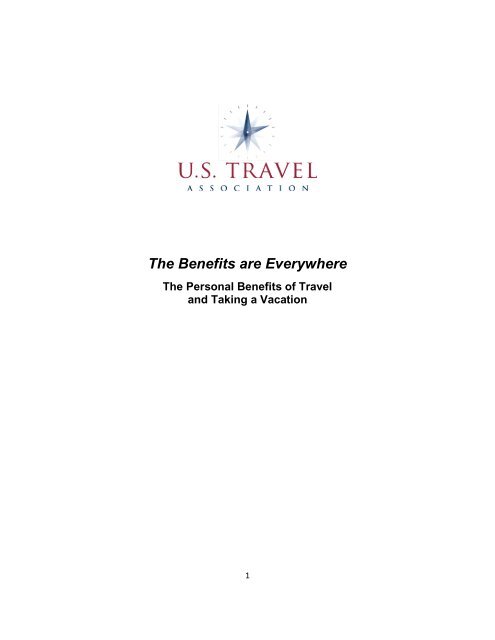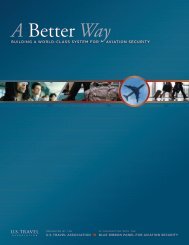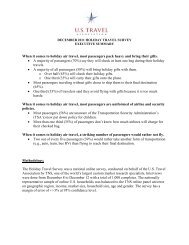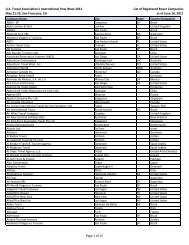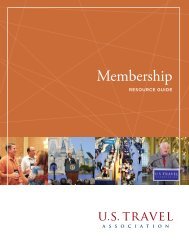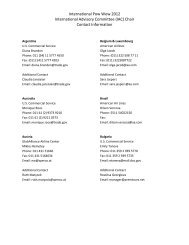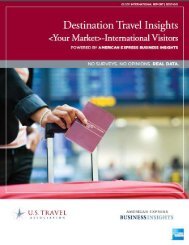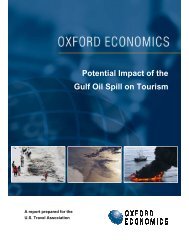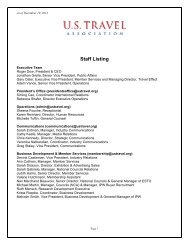The Benefits are Everywhere - US Travel Association
The Benefits are Everywhere - US Travel Association
The Benefits are Everywhere - US Travel Association
Create successful ePaper yourself
Turn your PDF publications into a flip-book with our unique Google optimized e-Paper software.
<strong>The</strong> <strong>Benefits</strong> <strong>are</strong> <strong>Everywhere</strong><br />
<strong>The</strong> Personal <strong>Benefits</strong> of <strong>Travel</strong><br />
and Taking a Vacation<br />
1
Health <strong>Benefits</strong><br />
“Voyage, travel, and change of place impart vigor.”<br />
Seneca, 1 st<br />
Century philosopher<br />
Taking vacations can improve health in several measurable ways. For example:<br />
• An annual vacation can cut a person’s risk of heart attack by 50 percent. 25<br />
• Middle-aged men at high risk for coronary heart disease who take frequent annual<br />
vacations <strong>are</strong> 21% less likely to die of any cause and 32% less likely to die of their<br />
coronary heart disease. 1<br />
• Homemakers who vacation only once every six years or less have almost twice the risk<br />
of developing myocardial infarction or coronary death than do homemakers who take<br />
two or more vacations a year. 2<br />
• Blood pressure, heart rate, and levels of epinephrine – a stress hormone – decline on<br />
holidays of only one or two days. 3<br />
• Recuperation and improvement in exhaustion <strong>are</strong> facilitated by free time for one’s self,<br />
warmer (and sunnier) vacation locations, exercise during vacation, good sleep, and<br />
making new acquaintances, especially among vacationers reporting higher levels of<br />
work stress. 7<br />
• <strong>Travel</strong>ers rate their overall health one full point higher (on a scale of 1 to 5) while on<br />
vacation. <strong>The</strong>y also get three times more deep sleep after their vacation and sleep<br />
almost 20 minutes longer after their vacation. 26<br />
• Leisure has been found to contribute to overall well-being by helping people maintain<br />
both their physical and mental health. 6<br />
o For example, a study of almost 20,000 Canadians showed that physically-active<br />
leisure has been found to directly contribute to higher levels of physical and<br />
mental health – especially during times of stress. Higher levels of participation in<br />
physically-active leisure – and travel is definitely physically-active leisure – also<br />
helped people suppress high levels of work stress. 4<br />
o Another study of Canadians showed that there <strong>are</strong> long-term health benefits of<br />
using leisure as a coping mechanism during stressful times. 5<br />
2
Relationship, Educational, and Cultural <strong>Benefits</strong><br />
“<strong>Travel</strong> is fatal to prejudice, bigotry, and narrow-mindedness…Broad, wholesome, charitable<br />
views of men and things cannot be acquired by vegetating in one little corner of the earth all<br />
one's lifetime.”<br />
Mark Twain<br />
• Women who take more vacations <strong>are</strong> more satisfied with their marriages. 28<br />
That may be<br />
because:<br />
o At least four out of ten travelers feel more romantic on vacation (42%), and<br />
nearly one-third admit to making love more often on vacation (31%). 26<br />
o It could also be due to the fact that over half of employed Americans say they<br />
come back feeling reconnected with their family after vacation (53%). 29<br />
• A clear majority of students who traveled on an international exchange program felt they<br />
had become more trusting, open-minded, flexible, confident, and tolerant as a result of<br />
their travel experiences. In addition, eight out of ten said that the primary benefit of these<br />
travels is a desire for more travel. 11<br />
• Eight out of ten affluent leisure travelers consider vacations to be very important to their<br />
wellbeing (82%) and it’s easy to see why:<br />
o More than half feel more rested and relaxed when they return from vacation<br />
(52%), and almost as many state they sleep later on vacation (49%). 26<br />
• Even the anticipation of vacation travel generates an increase in positive feelings about<br />
one’s life as a whole, family, economic situation, and health. 22<br />
• Life satisfaction also increases during vacation, and these effects continue after<br />
returning home, according to a study of employees at the University of Tennessee. 3<br />
• Patients who had previously appe<strong>are</strong>d isolated and withdrawn at a Midwestern Veteran’s<br />
hospital were able to have conversations after taking a vacation. In fact, staff reported<br />
that vacations appe<strong>are</strong>d to “lift the aura of depression” that was part of the emotional<br />
trauma of dealing with prolonged illness. 8<br />
3
C<strong>are</strong>er and Productivity <strong>Benefits</strong><br />
“Making yourself available 24/7 does not create peak performance; recreating the boundaries<br />
that technology has eroded does.”<br />
--Edward Hallowell, MD. Harvard Medical School<br />
Spending time away from the office – especially traveling – also provides numerous benefits for<br />
workers and their employers.<br />
• Three out of four executives believe that vacations <strong>are</strong> necessary for them to prevent<br />
burnout (78%) or that vacations improve their personal job performance (75%). Nearly<br />
as many – two out of three – believe that vacations improve their creativity (68%). 20<br />
o Indeed, an inability to take a break can lead to stress, burnout, and a greater<br />
likelihood of feeling betrayed and angry when things do not go well at work.<br />
Anxiety of top executives often translates into low morale and slumping<br />
productivity throughout the ranks. 24<br />
• Burnout decreases significantly during two-week vacations, according to researchers at<br />
Tel Aviv University. 3<br />
• <strong>Travel</strong>ers experience a 25% increase in performance on vigilance tests after returning<br />
from vacation – travelers 45 or older show a 50% increase in performance. 26<br />
• <strong>The</strong>re is also a positive relationship between vacations and intellectual functioning<br />
among women from 65 to 92 years old, according to a study by the South Coast Institute<br />
for Applied Gerontology. 3<br />
• Overwork costs employers about $150 billion a year in stress-related absences. 25<br />
o And the loss doesn’t stop there: workers get no more done when they work 50hour<br />
work weeks than when they work 40-hour work weeks. 25<br />
o In fact, Europe, which ensures that workers get ample vacation time, had higher<br />
productivity growth than the United States in most years between 1981 and<br />
2000. 25<br />
• <strong>The</strong>re's a good chance the benefits of vacation will go straight to the bottom line.<br />
According to a study by American Express, more than a third of small-business owners<br />
say their best ideas – the ones that lead to business growth – come not at work but<br />
during their downtime. 12<br />
4
• Rather than detracting from work, vacationing and a having fulfilling life outside of work<br />
enhance business accomplishments, and several organizations – both within and<br />
outside the travel community – <strong>are</strong> taking note: 12<br />
o PricewaterhouseCoopers tracks employees who have not taken enough<br />
vacation, sending reminders to them and their supervisors that they should do<br />
so. 21<br />
o <strong>The</strong> Sheraton Hotel in Chicago is offering a “BlackBerry Check-In Program,”<br />
which allows guests to lock up their PDAs with the belief that doing so allows<br />
travelers to better focus on their business partners or families while they're<br />
traveling. Guests who lock away their PDA for 48 hours can receive a<br />
complimentary stay, room upgrades, dinner at the hotel's restaurant, and a map<br />
to encourage them to see and enjoy Chicago with their friends and families –<br />
rather than read emails on their devices. 21<br />
o A Cincinnati-based maintenance-services firm found that after a liberal vacation<br />
policy went into effect, employee turnover dropped and employee morale and<br />
productivity rose. 25<br />
o During an extended vacation, steel workers reported more interactions and<br />
activities with their spouses and children. And one out of four of these workers<br />
felt that their work efficiency increased and that their jobs were more interesting<br />
after a vacation. 3<br />
5
Other Important Facts<br />
“<strong>The</strong> world is a book, and those who do not travel read only a page.”<br />
St. Augustine<br />
In the first Global Summit on Peace through Tourism, more than 450 world leaders of the travel<br />
and tourism community ratified an “Amman Declaration,” which recognized travel and tourism<br />
as a global peace industry. 10<br />
<strong>The</strong> right to annual vacations of a minimum duration is prescribed by law in 78 countries; some<br />
<strong>are</strong> so convinced of the necessity that there <strong>are</strong> penalties for deferring the vacation. 3<br />
One out of four American leisure travelers believe a vacation is a birthright (24%). 26<br />
One in four American leisure travelers would be willing to trade an increase in pay for an<br />
increase in vacation time (24%). 26<br />
But even so, Americans get the least amount of vacation<br />
time among countries in the industrialized world – an average of 8.1 days after a year on the job<br />
and 10.2 days after three years, according to the U.S. Bureau of Labor Statistics. In addition,<br />
the average American works one month more per year today than in 1976.<br />
Business travel can be fertile ground for discovering creative ideas for work or even a new<br />
business, many travelers say. <strong>The</strong> reason travel spurs inspiration is the stimulus, said Jeannine<br />
McGlade, co-author of “Stimulated! Habits to Spark Your Creative Genius at Work.” “When<br />
you’re in a new environment, you have what we call ‘eyes wide open. It’s not the ‘same old,<br />
same old’ where you tend to get into a rut and <strong>are</strong>n’t alert to having a ‘spark moment.’ Things<br />
<strong>are</strong> different and fresh during travel. You’re seeing things from a different perspective and you’re<br />
really paying attention.” Excerpt from “Finding New Inspiration on Business Trips,” New York<br />
Times, March 25, 2008<br />
“And that's the wonderful thing about family travel: it provides you with experiences that will<br />
remain locked forever in the scar tissue of your mind.” Dave Barry<br />
“I have found out that there ain't no surer way to find out whether you like people or hate them<br />
than to travel with them.” Mark Twain<br />
6
Resources<br />
1 Gump, B. B., & Mathews, K. A. (2000). Are vacations good for your health? <strong>The</strong> 9-year mortality<br />
experience after the multiple risk factor intervention trial. Psychosomatic Medicine, 62, 608-612.<br />
2 Eaker, E.D., Pinsky, J., Castelli, W. P. (1992). Myocardial infarction and coronary death among women:<br />
psychosocial predictors from a 20-year follow-up of women in the Framingham study. American Journal of<br />
Epidemiology, 135, 854-64.<br />
3 Borins, M. (2000). Go away: just for the health of it. Wholistic Press.<br />
4 Iwasaki, Y., Zuzanek, J., Mannell, R.C. (2001).<strong>The</strong> effects of physically active leisure on stress-health<br />
relationships. Canadian Journal of Public Health, 92(3), 214-218.<br />
5 Iwasaki, Y. (2006). Counteracting stress through leisure coping: a prospective health study. Psychology,<br />
Health and Medicine, 11(2), 209-220.<br />
6 Caldwell, L. L., & Smith, E. A. (1988). Leisure: an overlooked component of health promotion. Canadian<br />
Journal of Public Health, 79, 44-48.<br />
7 Strauss-Blasche, G., Reithofer, B., Schobersberger, W., Ekmekcioglu, C., Marktl, W. (2005). Effect of<br />
vacation on health: moderating factors of vacation outcome. Journal of <strong>Travel</strong> Medicine, 12, 94-101.<br />
8 Roy, C. (1982). Mini-vacations with center dialysis patients: a three year summary. Social Work in<br />
Health C<strong>are</strong>, 8(2), 117-123.<br />
9 Pols, J. and Kroon, H. (2007). <strong>The</strong> Importance of Holiday Trips for People with Chronic Mental Health<br />
Problems. American Psychiatric <strong>Association</strong>, (58), 262-265.<br />
10 Source: International Institute for Peace through Tourism : http://www.iipt.org/<br />
11 Richards, G. (June 2006) Summary Report of a Research Study Undertaken for the International<br />
Student <strong>Travel</strong> Confederation. Tourism Research and Marketing. http://www.tram-research.com/<br />
12 Ewers, J. E. (2007). All Work and No Play Makes a Company... Unproductive. U.S. News & World<br />
Report, 00415537, 8/13/2007, Vol. 143, Issue 5 <strong>The</strong> <strong>Benefits</strong> of <strong>Travel</strong> - 2008<br />
13 Johns, N. & Gyimothy, S. (2002). Market segmentation and the prediction of tourist behavior: the case<br />
of Bornholm, Denmark. Journal of <strong>Travel</strong> Research, 40(3), 316-27.<br />
14 Moscardo, G., Pearce, P., Morrison, A., Green, D., & O’Leary, J.T. (2000). Developing a typology for<br />
understanding visiting friends and relatives markets. Journal of <strong>Travel</strong> Research, 38(3), 251-59.<br />
15 Woodside, A. G., & Jacobs, L. W. (1985). Step two in benefits segmentation: Learning the benefits<br />
realized by major travel markets. Journal of <strong>Travel</strong> Research, 24(1), 7-13.<br />
16 Bieger, T. & Laesser, C. (2002). Market segmentation by motivation: the case of Switzerland. Journal of<br />
<strong>Travel</strong> Research, 41(1), 68-76.<br />
17 Etzel, M. J. & Woodside, A. G. (1982). Segmenting vacation markets: <strong>The</strong> case of the distant and nearhome<br />
travelers. Journal of <strong>Travel</strong> Research, 20(4), 10-14.<br />
18 Crompton, J. L. (1979). Motivations for pleasure vacation. Annals of Tourism Research, 6(4), 408-24.<br />
19 Gilbert, D. & Abdullah, J. (2004). Holidaytaking and the sense of well-being. Annals of Tourism<br />
Research, 31(1), 103-121.<br />
7
20 Williams, K. (1991). Avoid Burnout: Take Vacations. Management Accounting (New York, N.Y.) v. 73<br />
(August) p. 14<br />
21 Conlin, M. (2007). Do Us a Favor, Take a Vacation. Business Week, Issue 4035<br />
22 Gilbert, D. & Abdullah, J. (2002). A study of the impact of the expectation of a holiday on an individual's<br />
sense of well-being. Journal of Vacation Marketing, 8(4), 352-361.<br />
23 Palacia, V. & McCool, S. F. (1997). Identifying eco-tourists in Belize through benefit segmentation: A<br />
preliminary analysis. Journal of Sustainable Tourism, 5(3), 234-243.<br />
24 Mukherjee, A. (2000) I’m outta here. Business Week; Issue 3682, pF16-F16, 2/3p, 1c<br />
25 Allerton, H. E. (2003) Not Funny Ha Ha Funny peculiar. T+D; Vol. 57 Issue 12, p87-88, 2p<br />
26 YPartnership “National <strong>Travel</strong> Leisure Monitor.”<br />
27 Air New Zealand, Alertness Solutions; “Vacation Gap Study.” www.vacationgap.com<br />
28 Marshfield Clinic. (UNKNOWN).UNKNOWN. Wisconsin Medical Journal.<br />
29 Expedia “Vacation Deprivation Survey.”<br />
8


